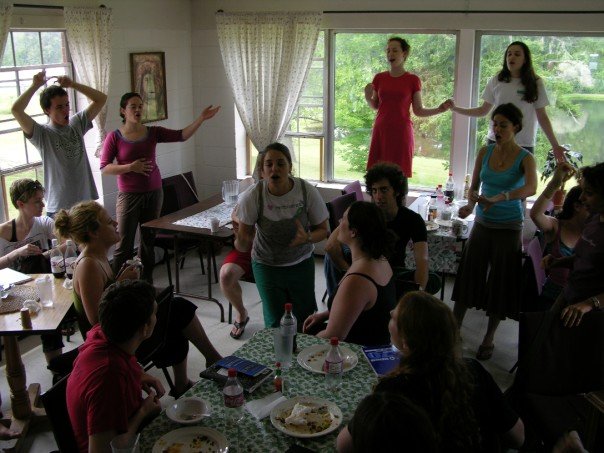For reasons that may or may not have anything to do with a certain production of Twelfth Night which I’m currently working on (you should come see it, by the way), I’ve been putting a lot of thought into the re-ordering of scenes in contemporary performance of Shakespeare’s work.
Specifically in the performance of Twelfth Night, the first and second scenes of the first act are often inverted in performance. For whatever reason (and these reasons differ with theatre companies/directors), theatre-makers feel that it’s sometimes appropriate to re-organize these two scenes.
The opening scene of Twelfth Night as it appears in modern editions depicts the Count

Rehearsal: a still life
Orsino at his court in Illyria lounging melancholic across the stage as he orders music played for him and pines for the love of the Countess Olivia (the first lines of this scene is the resounding “If music be the food of love, play on…”). The second scene shows us Viola crawling onto shore after her shipwreck and asking “What country, friends, is this?”.
The opening lines of Shakespeare plays always tell you something about the play. In the case of Twelfth Night, the show is steeped in music. Twelfth Night is a show which examines the effects of music on human beings and Orsino’s court is a place where music is constantly straining in and out in the background, filling the edges of the senses. Orsino calls music “the food of love” and does, in fact, seem to feed off of it for the entirety of the show. When the music stops, Orsino is awakened to the harsh realities of life outside his court. His veil of melancholy and self-delusion is lifted, and he finally sees things for what they are.
Orsino speaks the opening and closing lines of the show (…with the exception of Feste’s song which I would argue does not fall into the category of “speech” so we cannot classify it as the “last lines”). It’s not often that Shakespeare bookends his shows this way and thus we should take special note of the move in Twelfth Night. Orsino at the beginning is very different from Orsino at the end; everything and nothing has changed. This is highlighted by his words and the impetus to speak them and through this the audience is forcibly confronted by the journey which Orsino has taken through the course of the show.
By having the first scene occur in a world and a story already in progress, Shakespeare establishes and highlights that world. We are shown Illyria and how wacky it can be before the play’s outsider (Viola) enters that world. It establishes something before fully explaining it; allows the audience to encounter an oddity before the oddity is laid before them in its full detail and glory. In a way, it shocks an audience into paying attention. It’s a lot easier for a modern audience to glaze over the lengthy descriptions which populate I.ii than it is for them to ignore the pining Count in I.i.

More rehearsing
Perhaps most importantly, bending a script to one’s will is the cheater’s way out of solving an acting problem. If you, as a director/company don’t think that you can deal with the script Shakespeare wrote, then don’t perform Shakespeare. When an actor encounters a problem, he doesn’t simply change the line to fix that problem; he gets creative. Shakespeare’s text should be treated with the same integrity. Now granted, I do think that there is a certain amount of cutting that goes into any healthy modern production of Shakespeare’s text. I’m also not completely averse to changing small words for the sake of clarity (just make sure you check it with your dramaturg first). I have even enjoyed productions that played fast a loose with the text; but this sort of thing takes a great deal of care and experience. As a general rule, don’t re-arrange Shakespeare. Just don’t do it. It’s sloppy, tasteless, and gives purists like me a headache.
In the interest of full disclosure, the group decided to swap I.i and I.ii in our production (on a day when I wasn’t there to dissent). I have made the full extent of my discontent with the decision known and have no plans to censor my opinion about this issue. Despite this lapse in judgment, the production is a solid one with a lot of fun and energy and I highly recommend you come see it (if for no other reason than now you can snob out the egregious violation of textual integrity innate in the aesthetic choice of scene-swapping).



